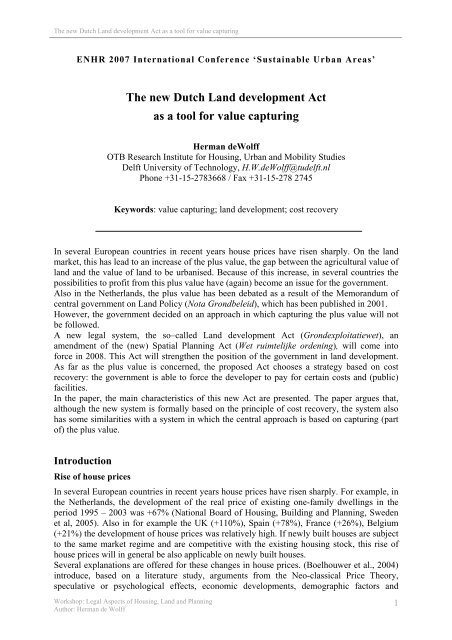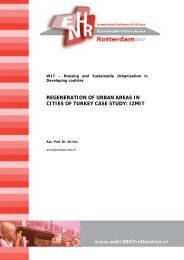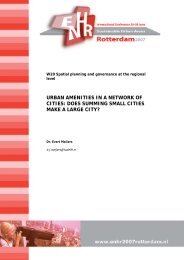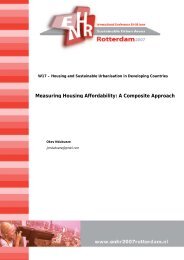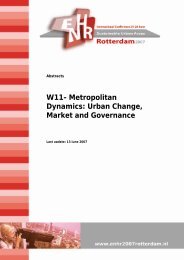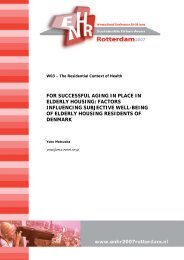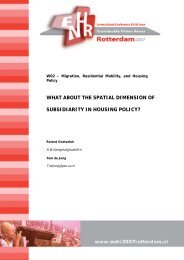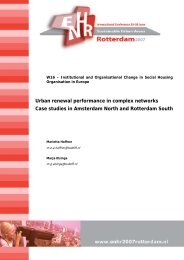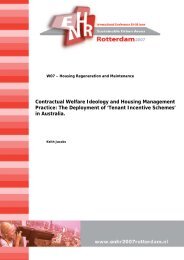The new Dutch Land development Act as a tool for value capturing
The new Dutch Land development Act as a tool for value capturing
The new Dutch Land development Act as a tool for value capturing
You also want an ePaper? Increase the reach of your titles
YUMPU automatically turns print PDFs into web optimized ePapers that Google loves.
<strong>The</strong> <strong>new</strong> <strong>Dutch</strong> <strong>Land</strong> <strong>development</strong> <strong>Act</strong> <strong>as</strong> a <strong>tool</strong> <strong>for</strong> <strong>value</strong> <strong>capturing</strong><br />
ENHR 2007 International Conference ‘Sustainable Urban Are<strong>as</strong>’<br />
<strong>The</strong> <strong>new</strong> <strong>Dutch</strong> <strong>Land</strong> <strong>development</strong> <strong>Act</strong><br />
<strong>as</strong> a <strong>tool</strong> <strong>for</strong> <strong>value</strong> <strong>capturing</strong><br />
Herman deWolff<br />
OTB Research Institute <strong>for</strong> Housing, Urban and Mobility Studies<br />
Delft University of Technology, H.W.deWolff@tudelft.nl<br />
Phone +31-15-2783668 / Fax +31-15-278 2745<br />
Keywords: <strong>value</strong> <strong>capturing</strong>; land <strong>development</strong>; cost recovery<br />
In several European countries in recent years house prices have risen sharply. On the land<br />
market, this h<strong>as</strong> lead to an incre<strong>as</strong>e of the plus <strong>value</strong>, the gap between the agricultural <strong>value</strong> of<br />
land and the <strong>value</strong> of land to be urbanised. Because of this incre<strong>as</strong>e, in several countries the<br />
possibilities to profit from this plus <strong>value</strong> have (again) become an issue <strong>for</strong> the government.<br />
Also in the Netherlands, the plus <strong>value</strong> h<strong>as</strong> been debated <strong>as</strong> a result of the Memorandum of<br />
central government on <strong>Land</strong> Policy (Nota Grondbeleid), which h<strong>as</strong> been published in 2001.<br />
However, the government decided on an approach in which <strong>capturing</strong> the plus <strong>value</strong> will not<br />
be followed.<br />
A <strong>new</strong> legal system, the so–called <strong>Land</strong> <strong>development</strong> <strong>Act</strong> (Grondexploitatiewet), an<br />
amendment of the (<strong>new</strong>) Spatial Planning <strong>Act</strong> (Wet ruimtelijke ordening), will come into<br />
<strong>for</strong>ce in 2008. This <strong>Act</strong> will strengthen the position of the government in land <strong>development</strong>.<br />
As far <strong>as</strong> the plus <strong>value</strong> is concerned, the proposed <strong>Act</strong> chooses a strategy b<strong>as</strong>ed on cost<br />
recovery: the government is able to <strong>for</strong>ce the developer to pay <strong>for</strong> certain costs and (public)<br />
facilities.<br />
In the paper, the main characteristics of this <strong>new</strong> <strong>Act</strong> are presented. <strong>The</strong> paper argues that,<br />
although the <strong>new</strong> system is <strong>for</strong>mally b<strong>as</strong>ed on the principle of cost recovery, the system also<br />
h<strong>as</strong> some similarities with a system in which the central approach is b<strong>as</strong>ed on <strong>capturing</strong> (part<br />
of) the plus <strong>value</strong>.<br />
Introduction<br />
Rise of house prices<br />
In several European countries in recent years house prices have risen sharply. For example, in<br />
the Netherlands, the <strong>development</strong> of the real price of existing one-family dwellings in the<br />
period 1995 – 2003 w<strong>as</strong> +67% (National Board of Housing, Building and Planning, Sweden<br />
et al, 2005). Also in <strong>for</strong> example the UK (+110%), Spain (+78%), France (+26%), Belgium<br />
(+21%) the <strong>development</strong> of house prices w<strong>as</strong> relatively high. If <strong>new</strong>ly built houses are subject<br />
to the same market regime and are competitive with the existing housing stock, this rise of<br />
house prices will in general be also applicable on <strong>new</strong>ly built houses.<br />
Several explanations are offered <strong>for</strong> these changes in house prices. (Boelhouwer et al., 2004)<br />
introduce, b<strong>as</strong>ed on a literature study, arguments from the Neo-cl<strong>as</strong>sical Price <strong>The</strong>ory,<br />
speculative or psychological effects, economic <strong>development</strong>s, demographic factors and<br />
Workshop: Legal Aspects of Housing, <strong>Land</strong> and Planning<br />
Author: Herman de Wolff<br />
1


